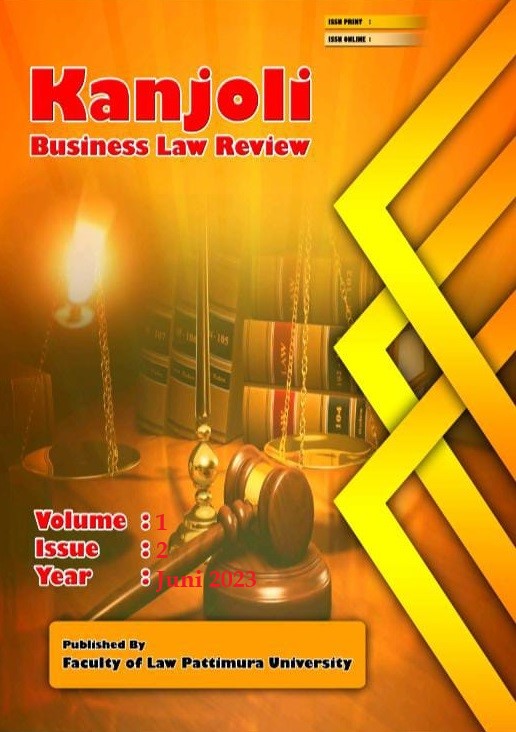Vaksin Covid-19 Sebagai Karya Paten Dalam TRIPs Agreement
Abstract
The Covid-19 pandemic is a Public Health Emergency, a challenge for developing and underdeveloped countries to get a Covid-19 vaccine. Patent protection that is accommodated in the TRIPS Agreement is considered burdensome for vaccine accessibility, because it has a direct impact on increasing vaccine prices, making it difficult for some countries with low per capita incomes and lagging industries to reach them. The purpose of this paper is to determine the arrangement of patent rights based on the TRIPS Agreement. The research method used in this paper is normative juridical, namely by examining library data or materials in the form of primary legal materials and secondary legal materials. Then it will be described descriptively and given a conclusion. The strict patent system and the exclusive rights of patent holders contained in the TRIPS Agreement are barriers to reaching pharmaceutical inventions. Therefore, every country needs a National Emergency Plan that can accommodate health services such as vaccines. This can be implemented using a Compulsory License or Government Use (Patent Implementation by the Government) instrument.
Downloads
References
Arimuliadi, Setia Untung, ”Perlindungan Negara, Paten Vaksin Covid-19, dan Potensi Monopoli”, Jurnal Dalam Bidang ilmu Hukum, Fakultas Hukum, Universitas Diponegoro, Semarang, 9 no 1, hal. 55. (2021): https://doi.org/10.14710/jhp.9.1.50-63.
Cita Citra Winda Noehardi, Kebijakan Kesehatan Publik dan Perlindungan Paten di Bidang Farmasi, Yayasan Pustaka Obor Indonesia, Jakarta, 2020.
Endang Purwaningsih, Seri Hukum Hak Kekayaan Intelektual: Hukum Paten, Mandar Maju.2019.
Fajlurrahman Jurdi, Logika Hukum, Prenadamedia Group, Jakarta, 2019.
Feryanto, dkk, “Perlindungan Hukum Terhadap Sumber Daya Gengetik dan Pengetahuan Tradisional (SDG-PT) Pasca Diundangkannya Undang-Undang Nomor 13 Tahun 2016Tentang Paten”, Journal of Intellectual Property, 1 no 1 (2020). 34: https://doi.org/10.20885/jipro.vol3.iss1.art2.
Ignatius Haryanto, John Locke dan Akar Pemikiran Kekayaan Intelektual, Kepustakaan Populer Gramedia, Jakarta, 2021.
Insan Budi Maulana, Politik dan Manajemen Hak Kekayaan Intelektual, Alumni, Bandung, 2009.
Liputan 6 (2021). Hak Paten Jadi Penyebab Ketimpangan Akses Vaksin Covid-19. Retrieved from: https://www.liputan6.com/health/read/4910664/kemelut-hak-paten-jadi-penyebab-ketimpangan-akses-vaksin-covid-19.
Muchtar Anshary Hamid Labetubun, “Public Domain in Dispute Settlement of Cancellation of Industrial Design Rights.”, International Journal of Innovation, Creativity and Change 10 no 5 (2019): 30. 10.53333/IJICC2013/10503.
Muhamad Djumhana, Hak Milik Intelektual: Sejarah, Teori, dan Praktiknya di Indonesia, PT. Citra Aditya Bakti, Bandung, 2014.
Rahmi Jened Parinduri Nasution, Interface Hukum Kekayaan Intelektual dan Hukum Persaingan, Raja Grafindo Persada, Depok, 2017.
Santoso, Tasa Gina, “The Comparative Studies of Compulsory License For Pharmaceutical Product Between Indonesia and India”, Journal of Intellectual Property, 2 no 1 (2019). 65: https://doi.org/10.20885/jipro.vol2.iss1.art5.
Sardjono, Agus, “HKI dan UU Pemajuan Kebudayaan”, Journal of Intellectual Property, 2 no 2 (2019):55. https://doi.org/10.20885/jipro.vol2.iss2.art5.
Sarah Selfina Kuahaty, “Perlindungan Konsumen Terhadap Peredaran Produk Kesehatan Ilegal di Era Pandemik Covid-19 Di Kota Ambon” Jurnal SASI, 27 no 2 (2021). 161: 10.47268/sasi.v27i2.453.
Sarah S Kuahaty , “Perjanjian Lisensi Sebagai Bentuk Perlindungan Merek”, Jurnal SASI, 21 no 1 (2015).
Teng Berlianty, “Formulasi Pengaturan Disclousure Requirements Sumberdaya Genetik Sebagai Hak Paten”, Kertha Patrika, 32 no. 2 (2017): 127. https:doi.org/10.24843/KP.2017.v39.i02.p04
Tim Lindsey dkk. Hak Kekayaan Intelektual, Suatu Pengantar, Alumni, Bandung, 2019.
The Coversatin.com. (2021). Bagaimana Hak Paten Berpengaruh Pada Kesenjangan Distribusi Vaksin Covid-19. Retrieved from: https://theconversation.com/bagaimana-hak-paten-berpengaruh-pada-kesenjangan-distribusi-vaksin-covid-19-157325.
Copyright (c) 2023 Palti Josua Jose, Teng Berlianty, Sarah Selfina Kuahaty

This work is licensed under a Creative Commons Attribution-NonCommercial 4.0 International License.
Authors who publish their manuscripts in this Journal agree to the following conditions:
- The copyright in each article belongs to the author, as well as the right to patent.
- Authors are able to enter into separate, additional contractual arrangements for the non-exclusive distribution of the journal's published version of the work (e.g., post it to an institutional repository or publish it in a book), with an acknowledgment of its initial publication in this journal.
- Authors are permitted and encouraged to post their work online (e.g., in institutional repositories or on their website) prior to and during the submission process, as it can lead to productive exchanges, as well as earlier and greater citation of published work.
- Authors have the right to self-archiving of the article (Author Self-Archiving Policy)











